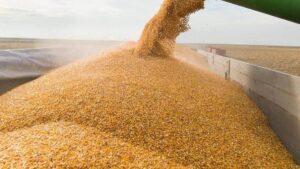
As of the end of February of the 2023/2024 marketing year, which started on July 1, Ukraine has already exported more than 29.1 million tons of grain, legumes and flour, Danylo Hetmantsev, Chairman of the Verkhovna Rada Committee on Finance, Taxation and Customs Policy, said on Telegram.
He clarified that in terms of major crops, 15.8 million tons of corn, 11.5 million tons of wheat, and 1.6 million tons of barley were supplied to foreign markets.
“Compared to the same date last year, there is a lag of almost 2.6 million tons (although, for example, wheat was shipped a quarter of a million tons more than last year),” the head of the parliamentary financial committee said.
Mr. Hetmantsev explained the slowdown in grain exports by the fact that for a month and a half, in July and the first half of August last year, when sea exports were forced to pause due to Russia’s withdrawal from the Istanbul grain initiative, Ukraine had to develop an “alternative grain corridor.” In August 2023, thanks to the Ukrainian Armed Forces, it became available, and in the first months, foreign shipowners were restrained and cautious, looking closely at whether the new route was really safe, he recalled.
“In November 2023, some ‘friends and neighbors’ began to create obstacles for us on the land border under artificial and far-fetched pretexts, and these processes are still ongoing,” Hetmantsev wrote.
The chairman of the parliamentary committee expressed confidence that Ukraine would soon completely close the current gap.
He emphasized that in recent months, Ukraine has returned to almost pre-war export volumes, 90% of Ukrainian grain is shipped to foreign customers by sea, and dependence on the land corridor on the western border is decreasing.
“Thus, Ukraine will continue to play the role of one of the guarantors of global food security, while at the same time replenishing the treasury with serious foreign exchange earnings (in the near future, agricultural products will remain a key item of Ukrainian exports),” Hetmantsev summarized.
The Unity Facility insurance mechanism for grain transportation by Ukrainian sea corridor, announced in mid-November 2023, has been extended to ships carrying not only grain but any other cargoes from February 2024, Oliver Wyman partner Crispin Ellison said.
“By combining the efforts of the industry and the government, we’ve been able to create a mechanism (facility) where prices are well under half of those in the normal commercial market. And now, this month, February, we’ve expanded that facility to include transportation of all cargoes, not just grain,” he said at a Wednesday webinar on political risk insurance organized by the U.S.-Ukraine Business Council (USUBC) and the U.S. Department of Commerce.
He said this will be formally announced on Friday, but the option is already available and effectively triples the mechanism.
Ellison recalled that after Russia withdrew from the Black Sea Grain Initiative, insurance rates increased for the military risk element alone to about 5%, which was completely unaffordable and led to a halt in shipping in July and August.
Established using a public-private partnership (PPP) in which the Ukrainian government provided a $20 million reimbursement fund, the Unity Facility insures approximately 1,000 vessels per year with a maximum insured value of $50 million for each vessel, supporting the export of approximately 30 million tons of grain. The reimbursement fund is accessed through a letter of credit with Ukrainian banks and DZ Bank.
According to Ellison’s submission, a parallel mechanism for cargo coverage, supported by EBRD financing for the Ukrainian government, is being considered.
The expert emphasized that the relatively small amount of insurance capital allowed exporting goods worth about $20 billion, and its estimate is 6-8% of Ukraine’s GDP.
As reported, the Unity Facility was created with the support of the UK government, international reinsurance broker Marsh McLennan and over a dozen more British insurance companies.
According to the Ministry of Restoration, the sea corridor created by the Navy of the AFU and the Danube since August 2023 provided for the export of almost 26 million tons of cargo, of which more than 18 million tons – the products of Ukrainian agrarians. It was specified that from the ports of “Greater Odessa” 854 ships were sent to 42 countries.

Since the beginning of the 2023-2024 marketing year, Ukraine has exported 28.579 million tons of grains and legumes, of which 4.703 million tons were shipped this month, Denys Bashlyk, Deputy Minister of Agrarian Policy and Food for Digital Development, Digital Transformation and Digitalization, said on Telegram, citing data from the State Customs Service.
According to the report, since the beginning of the current season, which began in July 2023, 11.237 million tons of wheat, 1.596 million tons of barley, 15.439 million tons of corn, and 1 thousand tons of rye have been exported.
As of February 26, the total export of Ukrainian flour is estimated at 73 thousand tons, including 69.3 thousand tons of wheat, the Deputy Minister of Agrarian Policy summarized.
As reported, Bashlyk informed that the harvest of grain and legumes in 2023 in Ukraine was carried out on an area of 10.609 million hectares, which is 97% of the plan, from which 58.993 million tons of grain were harvested.
Winter wheat plantings for the 2024 harvest in Ukraine amount to 4166 thou hectares (-834 thou hectares compared to the previous year), winter barley – 536 thou hectares (-255 thou hectares), and rapeseed – 1374 thou hectares (+110 thou hectares).
According to the newly improved forecast of the Ministry of Agrarian Policy, by the end of 2023, farmers can harvest 81.3 mln tons of grains and oilseeds, including 59.7 mln tons of grains and 21.6 mln tons of oilseeds.
Ukrainian agrarians intend to increase the acreage under soybeans and sugar beets and reduce corn, the Ministry of Agrarian Policy reported following a survey of farmers’ preparations for the spring crops sowing campaign for the 2024 harvest.
According to the report, 70% of respondents indicated that they plan to increase the area under soybeans by 21% on average compared to 2023.
The survey of the Ministry of Agrarian Policy, conducted through the State Agrarian Register, showed that during the spring sowing season, Ukrainian farmers will prioritize pulses, which will increase by 11%, and spring barley – by 7%. The area under spring rapeseed is expected to increase by 24%, sugar beet by 17%, and corn by 9%. The area under sunflower may potentially decrease.
In general, in 2024, the area under spring crops may decrease by 0.5 million hectares or 3.7% compared to last season, according to the Ministry of Agrarian Policy.

Export sales of Ukrainian wheat are steadily growing. Since the beginning of February, more than 2 million tons have been contracted, which could be a record volume of deliveries for the season. As of March, 1.4 million tons of wheat have already been sold.
This issue was discussed on February 20 during the weekly briefing organized by the analytical center of the First Agricultural Ukrainian Cooperative (FUAC), created within the Ukrainian Agri Council.
“Traders say that Indonesia is very actively involved in purchases of Ukrainian feed wheat. This Asian country has sky-high prices on the domestic market and is interested in importing grain. The demand price from Indonesia is USD260-265/t CIF. It is very profitable to export Ukrainian wheat to Indonesia. The fly in the ointment for these plans is the conflict in the Red Sea, where there is a high risk of shelling of the merchant fleet. This is still a systemic problem that negatively affects trade in the Black and Mediterranean Seas. The risk is holding back Ukrainian traders from fixing their positions in this direction. The market expects that in the second half of March, the passage of ships through the Red Sea may stop completely. A logistical solution would be to detour ships by sea through Africa, but this will raise the cost of freight by USD10-12 per ton,” was mentioned by the FUAC.
Ukrainian wheat continues to be the cheapest on most markets.
“Last week, Ukraine sold wheat with a protein content of 12.5% to Egypt at USD224 per ton for delivery to Egypt. For comparison, Russian wheat cost USD245 on an FOB basis. Ukrainian wheat is very cheap compared to other grains in the EU, Egypt and Turkey. The trade tries to keep prices low so that it makes sense to trade on many bases. Price gaps are large, which keeps the CPT market at low levels. Nevertheless, there are more and more sellers of wheat on FOB basis, many farmers are willing to sell for USD195 per ton at the Danube ports. At the same time, on CPT terms, wheat costs USD175-188 per ton, and by the end of the week, the price tags may lose another USD2 per ton,” added the analytical department of the FUAC.

Ukraine’s seaports are not yet at full capacity and are able to increase the potential of grain transportation, said Yuriy Lytvyn, Head of the Ukrainian Sea Ports Authority (USPA), at a meeting of the Grain Club of the Ukrainian Grain Association on Tuesday.
“The potential of transportation, in particular, from Odesa, is significantly higher. The proof of this is the record results of the Ukrainian “grain corridor”, which was opened after the termination of the “grain initiative” in December 2023,” he said.
According to Lytvyn, the figures for grain exports in January 2024 are slightly lower than the previous month. However, January is the month of the traditional decline in sea transportation.
At the same time, he noted an increase in the delivery of grain cargo to the ports of Greater Odesa by both rail and road.
“Today, the port of Chornomorsk has increased its car handling fivefold compared to the pre-war period. However, unfortunately, bulk cargo is not very good for Chornomorsk itself. There are some difficulties with the organization of the process,” said the USPA head.
He also emphasized that traders and local authorities are doing everything possible to speed up the process and reduce the time for unloading vehicles.
Speaking about the work of Pivdennyi port, Lytvyn noted that it is being used at 30-48% of its capacity to receive grain cargo.
“The Ministry of Infrastructure, together with the Armed Forces of Ukraine and us (USPA – IF-U), are working to expand the acceptance of cargoes that may be damaged (during the shelling of port infrastructure by the Russian side – IF-U). I mean container and ferry transportation,” Lytvyn said.
Answering a question about the fate of the port in Mykolaiv, the head of the USPA explained that the agency pays much attention to its fate and constantly consults with the military.
“The military leadership is unanimous in its position: due to security issues, unblocking the port of Mykolaiv is impossible. The ports of Mykolaiv region are under direct enemy fire from potentially dangerous areas. The military is not giving any forecasts (on the timing of their unblocking – IF-U),” he said.
The head of the USPA also reminded that Ukraine still has the occupied Kherson port, which has not yet had a single employee of the agency on its territory – it is closed.
As reported, the USPA said that Ukrainian seaports are ready to work in any case of destruction and can increase exports of agricultural goods.

In 2023, Agrotrade exported about 350 thsd tonnes of grain, of which 35%, or 116 thsd tonnes, was the share of its own products, and 65%, or 230 thsd tonnes, was from third-party producers, the company’s press service reported on Facebook.
According to the report, the agricultural holding supplied 214 thousand tons of grain to the world market by “deep water”, 108 thousand tons by the Danube, and 24 thousand tons by land.
“Despite the fact that logistics was a constant problem last year due to instability and high prices, we managed to establish ways to trade from different points – when the Black Sea ports became inaccessible, we started exporting via the Danube. And the opening of the new “grain corridor” greatly simplified our work. We were among the first in the country to use it. So far, it is working perfectly – everything is predictable and there are no queues. (…) In total, we have already shipped four ships, or 66 thousand tons of products, through the Grain Corridor 2.0,” the press service quoted Andriy But, Director of Agrotrade’s Foreign Economic Activity Department, as saying.
According to him, a significant achievement of the past year was the full sale of the agricultural holding’s own 2022 harvest and the increase in trade volumes. In particular, the company managed to export record volumes of winter rapeseed – more than 30 thsd tonnes – via the Danube in a short time. Also, in 2023, Agrotrade’s corn, soybeans and wheat were in demand on the global market.
Speaking about the plans for 2024, Booth said that the agricultural holding expects to fully export its own 2023 harvest and not slow down the pace of trade.
Agrotrade Group is a vertically integrated holding company with a full agro-industrial cycle (production, processing, storage and trade of agricultural products). It cultivates over 70 thousand hectares of land in Chernihiv, Sumy, Poltava and Kharkiv regions. Its main crops are sunflower, corn, winter wheat, soybeans and rapeseed. It has its own network of elevators with a simultaneous storage capacity of 570 thousand tons.
The group also produces hybrid seeds of corn and sunflower, barley, and winter wheat. In 2014, a seed plant with a capacity of 20 thousand tons of seeds per year was built on the basis of Kolos seed farm (Kharkiv region). In 2018, Agrotrade launched its own brand Agroseeds on the market.
Vsevolod Kozhemiako is the founder and CEO of Agrotrade.